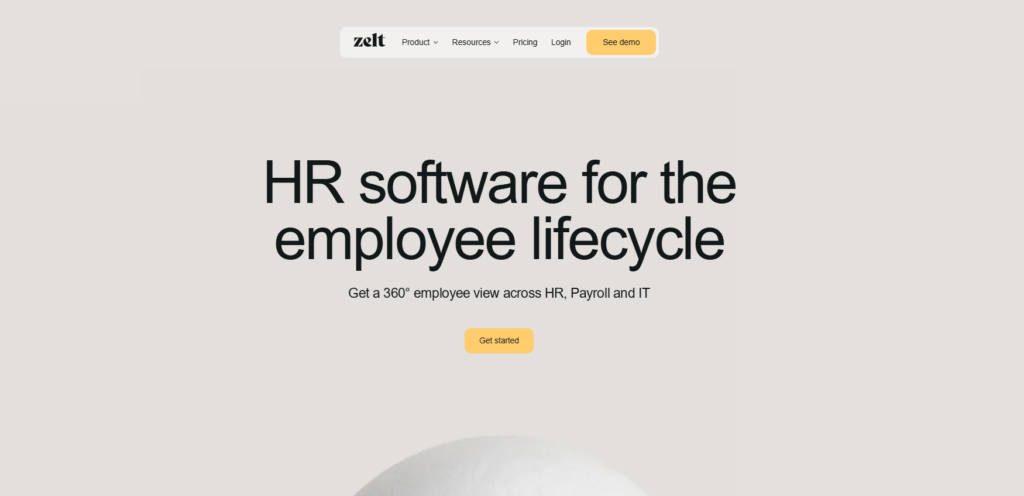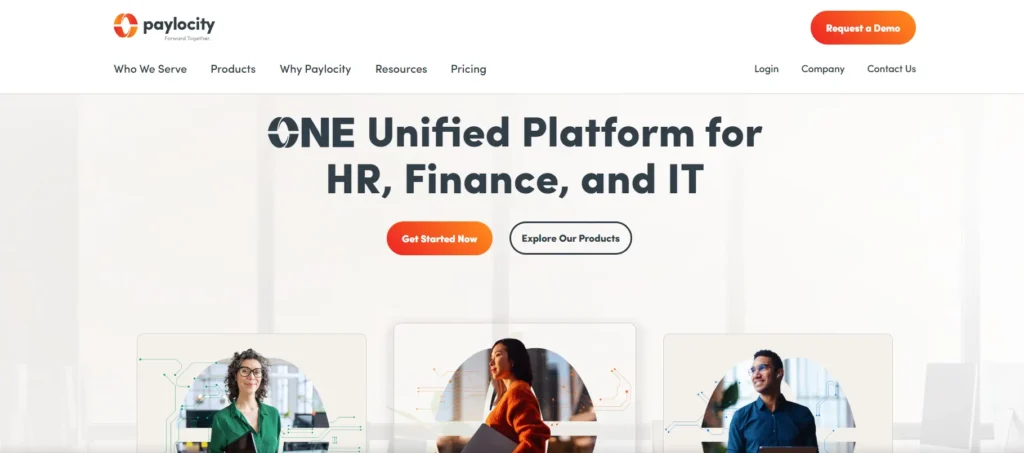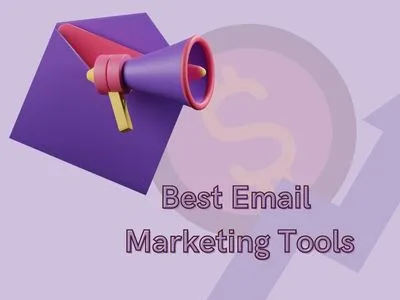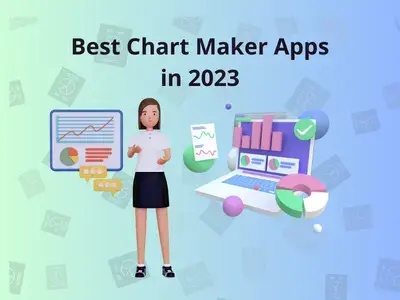Choosing HR and payroll software is something I’ve helped countless companies with, from 10-person startups to global enterprises. I know the difference between a system that looks good on paper and one that actually saves time, reduces errors, and supports employees.
That’s why I built this guide. It’s based on years of advising, testing, and troubleshooting these tools in the real world. Here you’ll find the seven platforms I recommend most in 2025
with straight talk on their strengths, weaknesses, and best-fit scenarios.
| Platform | Best For | Standout Strengths | Primary Trade-off |
| HiBob | Scaling / global mid-size | People-first design with Payroll Hub that syncs HR, payroll, and benefits in real time | Complexity for very small teams |
| ADP RUN | Growth and compliance needs | Reliable scaling, compliance support | Learning curve, opaque pricing |
| Zelt | All-in-one HR, payroll & IT automation | Unified platform combining HR, payroll, benefits, and device management | Newer tool, smaller integration ecosystem |
| Paylocity | All-in-one HR and payroll provider | Multi-state payroll processing | Complexity and rising costs |
| Gusto | Small, U.S.-centric businesses | Simplicity, transparent pricing | Limited to U.S., less depth internationally |
| Workday | Enterprise, global operations | Depth, analytics, global scale | Costly, long implementation |
| BambooHR | HR-centric firms needing payroll | HR tools + integrated payroll | Payroll U.S.-only, add-on costs |
1. HiBob – Best All-in-One for Growing & Global Teams

What I like most about HiBob is that it feels modern and people-first while still offering the compliance and reporting depth that scaling companies need. For teams expanding internationally, its native U.S. payroll paired with global provider integrations makes it especially versatile.
HiBob offers unified HR and payroll, excellent automation, and strong global capabilities. However, it has a ton of options and some advanced features depend on the package chosen.
| HiBob Features – At a Glance | |
| Payroll Features | HR Features |
| Automated tax filing & payments (native U.S./UK payroll + global integrations) | Employee records (HRIS) |
| Multi-country payroll support | Digital onboarding workflows |
| Wage garnishment support | Time & attendance tracking |
| Compliance dashboards & alerts | PTO / leave management |
| Performance reviews & goal tracking | |
| Compensation management (salary bands, pay cycles) |
2. ADP RUN – Best for Compliance & Growth

ADP RUN has long impressed me with how reliably it scales. You can start with basic payroll and then add HR modules as your company grows. I especially value its compliance dashboard and HR advisor access, which give small to mid-sized businesses peace of mind in highly regulated industries.
ADP RUN is built to scale, with trusted compliance expertise and reliable payroll services. On the downside, its interface is less intuitive, and pricing is only available by quote.
| ADP Run Features – At a Glance | |
| Payroll Features | HR Features |
| Automated payroll + tax filing | Employee records |
| Wage garnishments | Self-service portal |
| Compliance dashboard & alerts | Time & attendance |
| HR advisory services | PTO / leave tracking |
3. Zelt – Best for All-in-One HR, Payroll, and IT Automation

Zelt combines HR, payroll, and IT into one intuitive system that automates everything from onboarding to payments. It’s designed for growing teams that want to manage employee data, payroll, expenses, and even devices from a single platform.
| Zelt Features – At a Glance | |
| Payroll Features | HR Features |
| Automated payroll and tax filing | Employee records (HRIS) |
| Multi-country compliance | Time off tracking |
| Expense reimbursements | Onboarding/offboarding automation |
| Benefit management | Device and app management |
4. Paylocity: All-in-One HR & Payroll for Modern, Growing Companies

Paylocity is an all-in-one HR and payroll provider built for growing, mid-size, and enterprise-level organizations that want a single, unified system to manage people, processes, and performance. By bringing HR, Finance, and IT together on one centralized platform, Paylocity empowers teams to work smarter, collaborate seamlessly, and adapt quickly as business needs evolve.
Designed for today’s workforce, Paylocity combines powerful automation, industry-leading payroll accuracy, and next-generation AI to streamline your entire employee lifecycle—from recruiting and onboarding to compensation, benefits, learning, and analytics. Companies with multi-state, distributed, or hybrid teams rely on Paylocity to simplify complexity, ensure compliance, and deliver a modern employee experience at scale.
| Paylocity Features – At a Glance | |
| Payroll Features | HR Features |
| Automated tax filing, real-time calculations, error detection | Digital onboarding & document management |
| Accurate, fast, compliant payroll for mid-size & enterprise | Recruiting & applicant tracking |
| Payroll integrations: QuickBooks, NetSuite, Sage | AI-generated HR content & automated insights |
| HR integrations: ATS, LMS, ERP, benefits tools |
5. Gusto – Best for Simplicity & Ease

When I test payroll systems, Gusto consistently stands out for its clean interface and smooth onboarding experience. Setting up new employees, syncing PTO, and running payroll feels straightforward, even if you’ve never managed tl before. The platform also automates filings and compliance tasks that would otherwise take hours.
Gusto works well for small businesses thanks to its ease of use, predictable pricing, and responsive customer support. The trade-off is that its HR features are limited in scope, and it only supports payroll in the U.S.
| Gusto Features – At a Glance | |
| Payroll Features | HR Features |
| Automated tax filing | Employee records |
| Contractor payments (1099s) | Self-service portal (pay stubs, benefits selection) |
| U.S.-only payroll | Onboarding workflows |
| PTO tracking |
6. Workday – Best for Enterprise Complexity

Workday remains the gold standard in the enterprise category because it combines HR, payroll, and finance in one massive platform. Its advanced analytics and workforce planning tools set it apart, especially for global organizations managing thousands of employees.
Workday provides enterprise-level HR, payroll, and finance with advanced analytics and global reach. Its major drawbacks are the high cost and long, complex implementation, making it unsuitable for smaller companies.
| Workday Features – At a Glance | |
| Payroll Features | HR Features |
| Enterprise payroll (multi-country) | Global HRIS |
| Automated compliance | Employee self-service |
| Advanced audit trails | Time & attendance |
| PTO management |
7. BambooHR + Payroll – Best HR-First Platform

I’ve always liked BambooHR for its HR-first design, especially its applicant tracking and performance management tools. With the payroll add-on, it becomes a complete people-management system without losing the simplicity HR teams appreciate.
BambooHR shines with a strong HR core, including ATS and performance tools, alongside smooth payroll integration. The drawback is that it is limited to the U.S., and some HR features require extra cost.
| BambooHR – At a Glance | |
| Payroll Features | HR Features |
| Payroll add-on (U.S.-only) | Employee records |
| Tax filing within U.S. | Onboarding workflows (e-signatures, checklists) |
| PTO / leave management | |
| Self-service portal |
Which Is the Best for You?
The right choice depends on where your business is today. If you’re under 50 employees and need something simple, Gusto is often the easiest fit. If you’re HR-first and want payroll as an add-on, BambooHR makes sense.
For companies scaling quickly or expanding globally, HiBob or Rippling are the most flexible. If compliance is your top priority, ADP RUN has the edge, while PaySpace shines for multi-country payrolls in emerging markets. And if you’re a large enterprise with complex global needs, Workday remains the leader.
Common Mistakes to Avoid When Choosing HR Software
One of the biggest mistakes I see is underestimating compliance needs. Payroll isn’t just about paying people on time. Tax filings, wage garnishments, and regulatory changes can quickly become overwhelming if your system isn’t built to handle them. Another trap is ignoring integrations. Your HR platform won’t operate in a vacuum, and if it doesn’t connect with accounting, benefits, or time-tracking tools, you’ll be stuck doing double data entry.
Price is another common pitfall. It’s easy to go for the cheapest option, but if it can’t scale or lacks the features you’ll need in a few months, you’ll be facing an expensive and disruptive switch later.
And finally, too many buyers skip over the employee experience. If staff find the self-service portal clunky, the software creates more problems than it solves. A system only succeeds when both administrators and employees actually want to use it.
Conclusion
Choosing HR and payroll software isn’t just about ticking boxes on a feature list – it’s about finding a system that actually makes life easier for you and your team. The right platform should reduce admin work, keep you compliant, and give employees a smoother experience, whether that’s through a clean self-service portal or accurate, on-time pay.
There isn’t a single “winner” here. The top system is the one that fits your needs today and won’t hold you back tomorrow. My advice: take the time to test, ask tough questions during demos, and think beyond the short term. The right investment now will pay for itself many times over in efficiency, accuracy, and peace of mind.
FAQ
What is the top HR and payroll system?
It depends on your needs. In my view for 2025, HiBob delivers the best balance of payroll automation, HR depth, and global capabilities. But for smaller U.S. firms, Gusto or OnPay may serve better. And for large enterprises, Workday can be unmatched. The “top” one is the one that fits your scale, budget, and roadmap.
Is it risky to switch HR/payroll systems?
Only if done poorly. The biggest risks are data loss, misconfigured deductions, or downtime. Mitigate by running parallel payroll cycles, thorough testing, vendor support, and a phased/trial rollout.
Can I start with basic tools and upgrade later?
Absolutely. Many vendors offer modular or tiered systems. Start with core payroll and basic HR, then expand. Just ensure integrations and data portability are smooth.
How much does it cost?
Depending on the vendor, expect base fees plus per-employee monthly charges. Entry-level systems might run $5–15/employee, while enterprise systems with global support can cost hundreds of thousands per year. Always ask vendors for full cost breakdowns (modules, implementation, support).
For more articles check out our website.
- Best AI SEO Tools for SEO Automation in 2026 - January 14, 2026
- Top 5 Best AI Presentation Makers in 2026 - December 24, 2025
- Best AI Text Generator Plugin for Woocommerce: WriteText.ai - December 23, 2025


